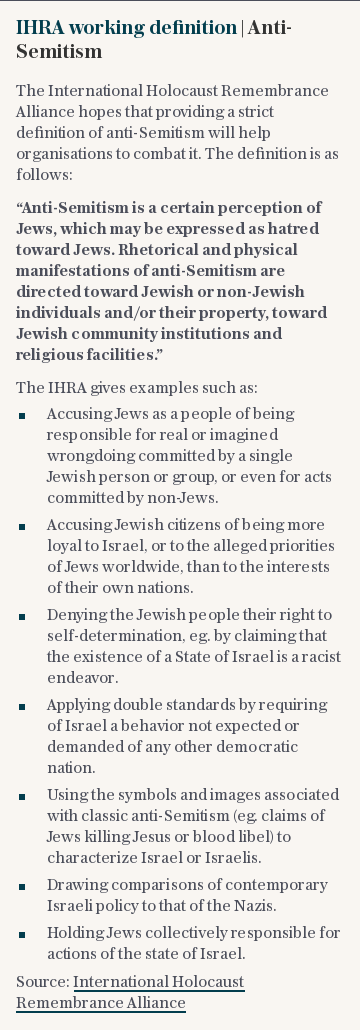Only one in five universities has adopted anti-Semitism definition despite Government's threats

Almost 80 per cent of universities have yet to adopt the IHRA definition of anti-Semitism despite a Government threat to defund institutions that refuse, the Telegraph has learned.
Just 29 of the UK’s 133 higher education institutions have adopted the International Holocaust Remembrance Alliance’s definition of anti-Semitism, which includes the examples of holding Jews responsible for the actions of Israel and comparing Israeli policy to that of the Nazis.
Robert Jenrick, the Communities Secretary, in January threatened universities with funding cuts if they did not adopt the definition and said it was “extremely disappointing” most had not.
Eighty universities responded to a Freedom of Information request by the Union of Jewish Students to say they had no plans to adopt the IHRA definition, while 17 said officials intended to discuss it the coming months.
Both Oxford and Cambridge are among the universities that have refused.
Some universities cited academic freedom of speech as a reason not to use it, while others said there was no need for a specific definition to be adopted in university policy.
Mr Jenrick said: “I’m extremely disappointed by these findings. Education is one of the most powerful tools we can use to combat anti-Semitism and adopting and actively using the IHRA definition of anti-Semitism sends a clear signal that Universities are serious about tackling antisemitism on campuses.
“Some progress has been made since I urged all universities and the Higher Education Institutions adopt the IHRA definition, but I urge others to do so without delay. It is simply unacceptable that universities accept public money, but refuse to take this step.
“I am frankly appalled by some of the examples of antisemitic abuse I continue to hear of on campus.”
Mr Jenrick has yet to deliver on his threat to “name and shame” the universities that do not adopt the definition.

Anti-Semitic incidents on university campuses rose by 38 per cent year-on-year in the first half of 2020, according to an analysis by the Community Security Trust.
Robert Halfon, the chair of the Education Select Committee, said the failure of universities to adopt the definition was “shocking”.
“Yet again, antisemitism is swept under the carpet by some of our major HE institutions in our country,” he said.
“It seems strange that they are prepared to virtue signal on so many PC issues but when it comes to Jewish people, they are just ignored. The HE Minister must make it absolutely clear that this guidance is adopted - no excuse or delay.”
The IHRA definition of anti-Semitism, also known as the “working definition” has been adopted by a number of governments and NGOs.
It states: “Anti-Semitism is a certain perception of Jews, which may be expressed as hatred toward Jews”.
“Rhetorical and physical manifestations of antisemitism are directed toward Jewish or non-Jewish individuals and/or their property, toward Jewish community institutions and religious facilities.”
The definition then lists eleven examples of anti-Semitism, including the repetition of a “myth about a world Jewish conspiracy or of Jews controlling the media, economy, government or other societal institutions”.


